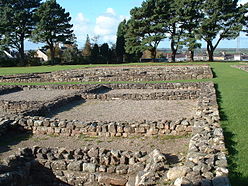Segontium Roman Fort
| Segontium | |
|---|---|
 |
|
| Founded | CE 77 or 78 |
| Abandoned | CE 4th century |
| Province | Britannia |
| — Stone structure — | |
| Built | 2nd century |
| — Wood and earth structure — | |
| Built | 1st century |
| Coordinates | 53°08′14″N 4°15′57″W / 53.1373°N 4.2659°W |
| Town | Caernarfon |
| County | Gwynedd |
| Country | Wales |
| UK-OSNG reference | SH485624 |
| Controlled by | Cadw |
| Website | Segontium |
Segontium (Old Welsh: Cair Seoint) is a Roman fort on the outskirts of Caernarfon in Gwynedd, North Wales. The fort, which survived until the end of the Roman occupation of Britain, was garrisoned by Roman auxiliaries from present-day Belgium and Germany. It was the most important military base and administrative centre in this part of Britain.
The fort probably takes its name either directly from the River Seiont or from a British settlement itself named for the river. It is possible, however, that it is connected to the Segontiaci, a British tribe mentioned by Julius Caesar.
Segontium was founded by Agricola in AD 77 or 78 after he had conquered the Ordovices in North Wales. It was the main Roman fort in the north of Roman Wales and was designed to hold about a thousand auxiliary infantry. It was connected by a Roman road to the Roman legionary base at Chester, Deva Victrix. Unlike the medieval Caernarfon Castle that was built alongside the Seiont estuary more than a thousand years later, Segontium was situated on higher ground to the east giving a good view of the Menai Straits.
...
Wikipedia

